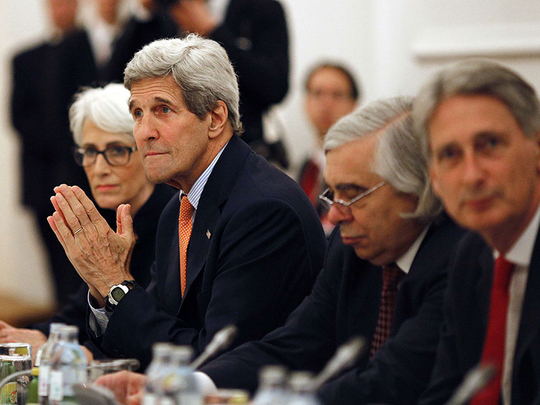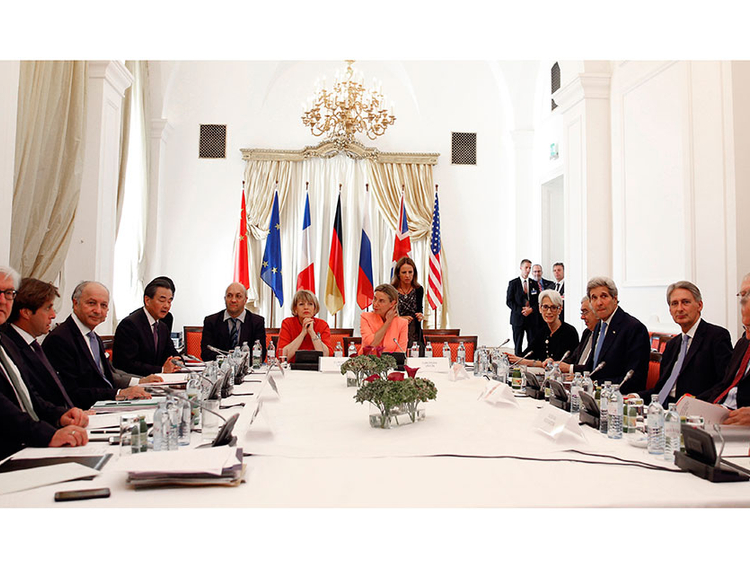
Vienna: Iran urged global powers late on Tuesday to drop a UN ban on arms sales to the country, describing it as an obstacle to a deal that was now in its final stages.
The arms embargo was not overly important as Iran had developed its own industry, but global powers "must change their approach on sanctions if they want a deal," Iran's negotiator Abbas Araghchi said on state television, adding the final text and most of the annexes were "almost finished."
"Western nations must be prepared to give up sanctions," Araghchi said. "The structure of the sanctions must not stay in place. The P5+1 countries must change their approach to the sanctions if they want a deal."
US officials insisted, however, Tuesday that there would be "ongoing restrictions on arms just like there will be ongoing restrictions regarding missiles" in any nuclear deal, which is to be endorsed by a resolution in the UN Security Council.
Negotiators are already drawing up a draft UN resolution which would also address the nuclear-related bans on arms trade and ballistic missiles, a senior administration official said.
Main text 'almost finished'
Araghchi said there were only two or three main points blocking a deal, adding "the main text of the accord is almost finished, and there are only a few remaining brackets where ministers need to take a political decision."
Four of the annexes including on sanctions, nuclear cooperation and the Iranian nuclear programme were just about complete, he said.
Ministers were still working on a fifth annexe drawing up a timetable for which actions need to be taken when by both sides.
Araghchi also repeated that the Iran team was not working to any deadline and were ready to stay in Vienna several more days.
"Extending for several months is no longer being considered," he added.
Talks past deadline
Iran and six major powers will keep negotiating past Tuesday's deadline for a long-term nuclear agreement as they tackle the most contentious issues, including the continuation of a U.N. arms embargo on Iran, the big powers said.
"We are continuing to negotiate for the next couple of days," EU foreign policy chief Federica Mogherini said outside the hotel where the talks between Iran, Britain, China, France, Germany, Russia and the United States are taking place.
The spokeswoman for the U.S. delegation, Marie Harf, said the terms of an interim deal between Iran and the six would be extended through Friday to give negotiators a few more days to finish their work.
"We're frankly more concerned about the quality of the deal than we are about the clock, though we also know that difficult decisions won't get any easier with time," Harf said.
"That is why we are continuing to negotiate." The United States and its allies fear Iran is using its civilian nuclear programme as a cover to develop a nuclear weapons capability. Iran says its programme is peaceful.
Important milestone
An agreement would be the most important milestone in decades towards easing hostility between the United States and Iran, enemies since Iranian revolutionaries captured 52 hostages in the U.S. embassy in Tehran in 1979.
A deal would be an important achievement for U.S. President Barack Obama and Iran's pragmatist president Hassan Rouhani, but both leaders face scepticism from powerful hardliners at home.
Russian Foreign Minister Sergei Lavrov said there was "every reason" to believe a deal would be done within "a few days", and that there was an "understanding" that most of the current sanctions against Iran would be lifted.
"There is only one big problem in terms of sanctions - it is the problem of a weapons embargo," he told journalists according to Russian news agency Interfax.
He said it was important to reach agreement on this as soon as possible, saying that "ending the bans on supplies to Iran of the weapons required to fight terrorism is a very, very relevant objective".
It is the fourth time the parties have extended the terms of the interim deal, which was struck in November 2013 and provided Iran with limited sanctions relief in exchange for a halt to the production of uranium enriched to a purity level of 20 percent.
Extension extended
The comprehensive deal under discussion is aimed at curbing Tehran's most sensitive nuclear work for a decade or more, in exchange for relief from economic sanctions that have slashed Iran's oil exports and crippled its economy.
The negotiators had initially given themselves an extra week when they missed a June 30 deadline for a final agreement, but a push in recent days was not enough to hammer out the deal.
The latest extension to Friday leaves open the possibility that an agreement will not arrive in time for a Thursday deadline set by the U.S. Congress in order to provide an expedited, 30-day review.
If a deal is sent to Congress between July 10 and Sept. 7, Congress will have 60 days to review it, taking into account lawmakers' August vacation. Obama administration officials fear that could provide more time for any deal to unravel.
"We are interpreting in a flexible way our deadline, which means that we are taking the time, the days we still need, to finalise the agreement," Mogherini said, adding that there remained several difficult issues to resolve.
Among these, officials said, are Iranian demands for a U.N.
arms embargo and ballistic missiles sanctions to be lifted, the timing of U.S. and EU sanctions relief, and disagreements over future Iranian nuclear research and development.
A senior U.S. official said U.N. restrictions would remain both on Iran's trade in arms as well as its access to missile technology but left open the possibility that these might be less onerous than they are at present.
U.N. restrictions on the development of Iran's missile programme date to 2006. They call for Iran to abandon its ballistic missile programme and aim to prevent it from developing "nuclear weapon delivery systems," which diplomats say covers any missile capable of delivering an atomic warhead.
"There will be an ongoing restriction on arms just like there will be ongoing restrictions regarding missiles," the senior U.S. official told reporters. Asked if these would be as tight as those now in effect, the official declined comment.
While U.S. Secretary of State John Kerry and Iranian Foreign Minister Mohammad Javad Zarif planned to remain in the Austrian capital to continue negotiating, the majority of the other foreign ministers planned to leave, some for only 24 hours.
U.S. officials are loathe to ease the conventional arms embargo against Iran, fearing it would allow Tehran to provide greater military assistance to militants in Yemen, Syria or elsewhere in the Middle East.













